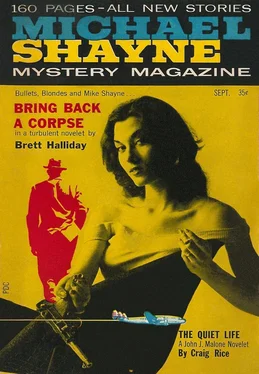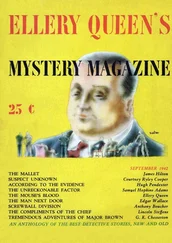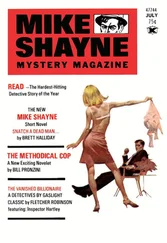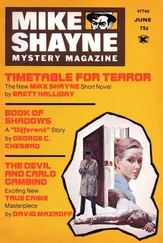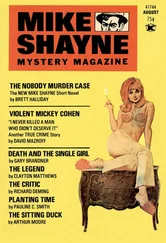Robert Bloch - Michael Shayne Mystery Magazine. Vol. 1, No. 1. September 1956
Здесь есть возможность читать онлайн «Robert Bloch - Michael Shayne Mystery Magazine. Vol. 1, No. 1. September 1956» весь текст электронной книги совершенно бесплатно (целиком полную версию без сокращений). В некоторых случаях можно слушать аудио, скачать через торрент в формате fb2 и присутствует краткое содержание. Город: New York, Год выпуска: 1956, Издательство: Renown Publications, Жанр: Детектив, на английском языке. Описание произведения, (предисловие) а так же отзывы посетителей доступны на портале библиотеки ЛибКат.
- Название:Michael Shayne Mystery Magazine. Vol. 1, No. 1. September 1956
- Автор:
- Издательство:Renown Publications
- Жанр:
- Год:1956
- Город:New York
- ISBN:нет данных
- Рейтинг книги:3 / 5. Голосов: 1
-
Избранное:Добавить в избранное
- Отзывы:
-
Ваша оценка:
- 60
- 1
- 2
- 3
- 4
- 5
Michael Shayne Mystery Magazine. Vol. 1, No. 1. September 1956: краткое содержание, описание и аннотация
Предлагаем к чтению аннотацию, описание, краткое содержание или предисловие (зависит от того, что написал сам автор книги «Michael Shayne Mystery Magazine. Vol. 1, No. 1. September 1956»). Если вы не нашли необходимую информацию о книге — напишите в комментариях, мы постараемся отыскать её.
Michael Shayne Mystery Magazine. Vol. 1, No. 1. September 1956 — читать онлайн бесплатно полную книгу (весь текст) целиком
Ниже представлен текст книги, разбитый по страницам. Система сохранения места последней прочитанной страницы, позволяет с удобством читать онлайн бесплатно книгу «Michael Shayne Mystery Magazine. Vol. 1, No. 1. September 1956», без необходимости каждый раз заново искать на чём Вы остановились. Поставьте закладку, и сможете в любой момент перейти на страницу, на которой закончили чтение.
Интервал:
Закладка:
He’s got a funny look on his face, so I call him on it, and he turns to Buster.
“You’re both tight now?” he asks him.
“Real tight.”
“Okay, should I tell him?”
“Tell him.”
Randy turns to me. “It’s about that Carmen bitch. You fought for nothing, both of you.”
“Say what you mean, Randy.”
“She’s going out with another stud, and you’re both out in the cold.”
I look at Buster, and he looks at me. Neither of us say anything till later, and we set it up. Both of us know what we got to do.
Eleven o’clock rolls around, and we’re both standing in front of Carmen’s stoop when she rolls down the street alone.
That’s the ticket. I grab her arm and twist her around when she tries to go past. Buster drops a garbage can over her head and we both start punching.
We punch her out, leave her crying on the sidewalk and walk away fast.
Three Wives Too Many
by Kenneth Fearing
Drink was no problem for Brown — his troubles were slow horses and women too fast at beating a path to the altar. But it was his spouses’ unforeseen fondness for cyanide cocktails that plunged Brown into the alphabet soup.
I
Richard C. Brown gazed in contented speculation across the breakfast table at the plain but pleasant face of his wife Marion. He was aware not only of her companionable silence, but savored also the cozy perfection of the tiny alcove, in fact, the homey restfulness of the entire bungalow.
For a moment, he almost regretted the need to leave this suburban idyll on the outskirts of Camden, and Marion, in order to reach his home in Newark by nightfall, and to be with Bernice, his fourth and most recent wife, at the usual hour. But he knew that domestic peace, to say nothing of his own safety, depended upon the most rigid adherence to his fixed routine.
Bernice, a natural and vivacious blonde, was much younger and very much prettier than Marion, whose tightly combed hair showed an unmistakable tinge of gray in its otherwise inky darkness. Marion, in fact, was the wife Richard had who was as old as himself. When he married her, he had rather felt he was making a reckless gamble.
But now, after four years — no, come to think of it, five years — he felt she had turned out extraordinarily well. Whereas Bernice, he had to face it, still couldn’t cook, after almost a year of marriage. Her cooking, like her disorderly housekeeping, would probably never improve.
Still, she was lively, and decorative, though by no means as gorgeous as the ripe, still magnificently cream-skinned and red-haired Lucille. Lucille was his first wife, and although nowadays she was showing more and more ill temper, especially when she drank, he was still very fond of her, and they still maintained their original home in Hartford.
He would be seeing her, on schedule, three days hence. After that, came the turn of the dark, brooding, capricious Helen, his second, in a suburb of Boston. Helen was a little extravagant. She always had been. But what were a few faults? They were only to be expected. After all, he probably had a few, himself.
So Richard C. Brown speculated, as he often did, weighing the pros and cons of this life he led.
Had he chosen wisely in selecting matrimony as his profession? Richard frowned, faintly, and softened the harsh phraseology of the question. He hadn’t chosen it, exactly. He had drifted into it, beginning as an ardent, even a romantic, amateur. It was so easy to get married that he had not even thought of that vulgar word, bigamy, until some time after he had already committed it.
But after two ceremonies, with a third impending — his match with Marion — yes, by then he had realized he was launched upon a special type of career, one that might have certain risks attached, but one that also, with care and prudence, offered rich rewards.
“Richard? Is that what’s worrying you?”
Richard returned his attention to Marion, suddenly aware that her voice echoed a whole series of remarks he had not quite caught. Richard smiled, genuinely surprised.
“Worrying me, dear?”
“For a minute, you were frowning. I thought perhaps your mind was on that offer to buy the house and lot. It was such a big price the broker offered, I could hardly believe it. I thought maybe you regretted turning it down. I wonder if you did it just on my account, even though you thought it was really a mistake to pass up the chance. Was that it, Richard?”
Richard was still more surprised — honestly surprised, and deeply touched.
“No, nothing’s worrying me,” he said, in affectionate rebuke. “Least of all, that proposition to sell. I’d forgotten all about it.”
Marion, pouring him a second cup of coffee, pursued the subject to its logical end. “Because, if the offer is still open, and you think we ought to sell, I’ll sign. Our joint title to the deed, I mean. Perhaps you thought I sounded unwilling before. But that was only because I didn’t really understand what a wonderful price we were being offered.”
Richard was mildly amused, but still more moved. The offered price had been quite good, certainly, but by no means high enough to justify the nuisance of finding or building another place, then moving and getting established.
“No,” he said, firmly. “I’m quite happy here, and we won’t think of selling, unless you’ve changed your own mind, and that’s what you want, yourself.” With large and patient generosity, he emphasized the point. “Since I have to be away so much, on business, I’ve always felt any decision about the house should be mainly up to you. That’s why I insisted, from the first, that title to the property should be in both our names.”
He did not add, though he privately noted the fact and gave himself a good mark for it, that this was one of his fixed rules for lasting success in marriage on a mass basis. Never play the domestic tyrant, he often told himself. Let the little woman — whichever one it was, though Lucille and Helen were hardly little — make most of the household decisions, or at least imagine she made them. It kept her happy and, whenever he had to make an important move, made her all the more amiable in deferring to him.
Sometimes, at moments like this, Richard wished he had some friendly, professional colleague with whom he could talk over the finer problems of, say, quadruple and concurrent matrimony. But this could never be. Richard did not doubt that superior operators, like himself, were in existence. But they were not readily to be found — any more than he himself was.
There were only two types of repeaters the public ever heard about, and Richard disdained them both. On the one hand, he was no idiot Romeo who married seven or eight pretty but penniless young things, usually in the same region if not the same city, and inevitably came to grief on some absurd but mathematically predictable mischance. Love was the key-word to describe this type, love and carelessness.
Then there was the other well-publicized practitioner, the sinister Bluebeard who, having married for money alone, then proceeded to do away with... No, this gruesome technique so revolted Richard he shrank even from thinking about it.
Marriage should be undertaken only for money and love. Richard imagined himself giving this sage advice to some earnest young man who might appeal to him for guidance, before choosing this specialized vocation as his own life-work. Marry for money and love, and never relax one’s careful attention in fostering each, that was what Richard would tell the acolyte.
Quite carried away by the thought, Richard crumpled his napkin and slapped it down beside his breakfast plate in brisk, executive encouragement. Of course, there were hundreds of other facets to such a career, minor perhaps, but highly important. There was the choice of employment one should pretend to have, for instance, the changes of identification that would never overlap, and... Richard sighed, abandoning these thoughts as idle. After all, there was no young man seeking his counsel. In the nature of things, as long as he remained successful, there never would be.
Читать дальшеИнтервал:
Закладка:
Похожие книги на «Michael Shayne Mystery Magazine. Vol. 1, No. 1. September 1956»
Представляем Вашему вниманию похожие книги на «Michael Shayne Mystery Magazine. Vol. 1, No. 1. September 1956» списком для выбора. Мы отобрали схожую по названию и смыслу литературу в надежде предоставить читателям больше вариантов отыскать новые, интересные, ещё непрочитанные произведения.
Обсуждение, отзывы о книге «Michael Shayne Mystery Magazine. Vol. 1, No. 1. September 1956» и просто собственные мнения читателей. Оставьте ваши комментарии, напишите, что Вы думаете о произведении, его смысле или главных героях. Укажите что конкретно понравилось, а что нет, и почему Вы так считаете.
